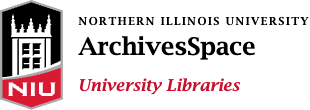Latino Studies Center
Abstract
The records of the Latino Studies Center are a subgroup within the Academic Centers record group of the University Archives. There are minimal records in the collection at present.
Dates
- created: 1975-1998
- Other: Majority of material found in 1975-1998
Biographical or Historical Information
The Minor in Latino Studies was managed by the Center for Minority Studies from 1974 until being placed under the control of the Office of the Coordinator for the Latino Program in 1978. Both of these departments were regulated by the Dean of International and Special Programs. The Latin American Studies Minor was originally an interdisciplinary minor in the College of Liberal Arts and Sciences organized and directed by the assistant dean. In February of 1978, discussions on the possibility of uniting the two minors under a Center for Latino and Latin American Affairs began. The Board of Regents received a petition for approval in July, and at the September 21, 1978, meeting, authorized the plan.
When the Center for Latino and Latin American Affairs was founded on October 1, 1978, its declared intent was "to design and unite, and thereby strengthen, two previously existing academic entities: the Office of the coordinator for Latino Programs and its various academic activities and the Minor in Latin American Studies." As a result of this merger, the Center became one of the first interdisciplinary centers in the United States to combine the study of Latinos in this country with research of their nations of origin.
In a Latin American Studies recommendation, three reasons describing the importance of the program were given: 1) National defense--understanding the recipients of financial aid is considered necessary so that aid programs can be productive; 2) Restructuring and inward-focussing extension of Latin American studies programs; 3) Satisfying the educational requirements of the half-million Latinos.
The Latino Studies program, from 1974 to 1977, was a series of courses and other preparations intended to research the origins, motives, ambitions, and hopes of Chicanos, Puerto Ricans, and other Latinos developing communities in the United States. There were problems with this, because no classes dealing with Latinos in the United States were offered. Instead, overviews of Latin America and of minorities were taught. Latino Studies was intended to encourage the growth of Bilingual Education and of a Latino Studies section in Foreign Languages. This would allow Latino students to rediscover their heritage and to learn about their societies, and also permit non-Latino students, who are so inclined, to study Latino heritage and to appreciate those communities.
Latin American Studies also underwent some changes. A steering committee agree, in 1975-1976, to develop two possibilities for completing the Latin American Studies minor. The first alternative was the Arts and Letters option, having a Spanish requirement and emphasizing archaeology, artistic, and literary works of Latin American civilization. The other alternative, the option in Area Studies, had no language requirement and emphasized the social sciences. Later, two other emphases were added: the emphasis in Latino Studies, which has been discussed, and Bilingual Studies, which focused on the operations of language, cultures, and educational processes directed at bilingual Latino students.
Vernon Lattin, an English professor, was chosen to be the director of the Center in 1979. He was succeeded in 1982 by Felix Padilla, a sociology professor. In the fall on 1988, after Padilla left, Michael Gonzalez was hired as director of the Center until a permanent director could be found. In April of 1989, Gonzalez, an associate professor of history, was given a five-year term as director.
Along with the Center, a number of organizations were founded for the support of Latino students. Among these are the Organization of Latin American Students (OLAS), Office of University Resources for Latinos, FLORES, and Movimiento Estudiantil Chicano de Aztlan (MEChA). OLAS was begun in 1975 to help Latino students adapt to life on a college campus. OLAS takes care of Latino academic programming and sponsors cultural events. The Director of the Center for Minority Studies administers OLAS. University Resources for Latinos was formed in 1986 from OLAS. It is responsible for looking after the careers, cultures, and finances of Latino students. FLORES was a Latino women's social organization. Set up in 1980, FLORES used its activities to promote self-awareness. Movimiento Estudiantil Chicano de Aztlan (MEChA) is an organization that helps to support Chicano students in their traditions, history, and language.
Note written by Program Review-Center for Latino and Latin American Affairs, Dr. Felix M. Padilla, 1983
Full Extent
0.50 Linear Feet
Language of Materials
English
- Title
- Latino Studies Center
- Description rules
- Other Unmapped
- Language of description
- Undetermined
- Script of description
- Code for undetermined script
- Language of description note
- und
Repository Details
Part of the Northern Illinois University Repository
Founders Memorial Library
Northern Illinois University
DeKalb IL 60115 US
815-753-9392
rhcua@niu.edu

